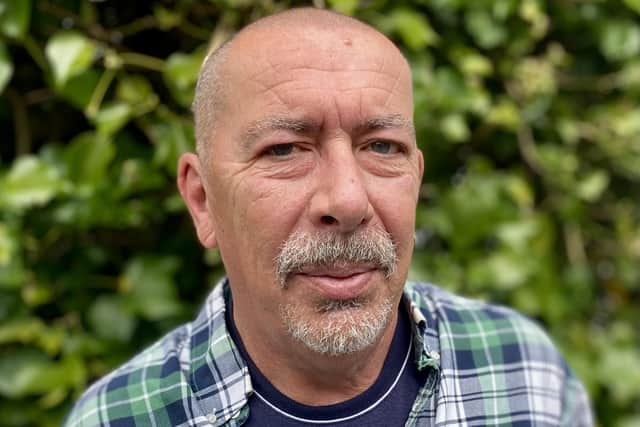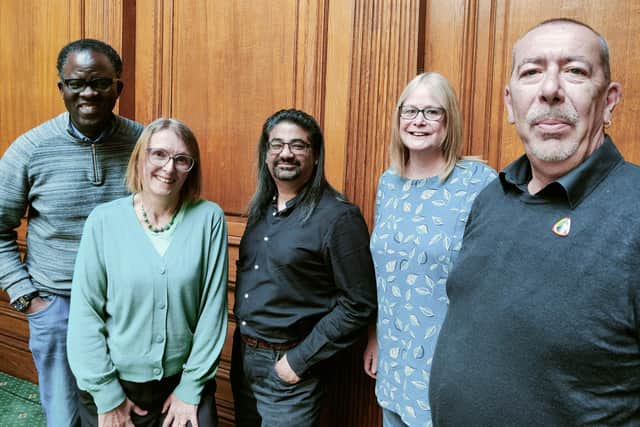Former Emmerdale and Coronation Street producer shares his belief that 'the arts can save lives'
and live on Freeview channel 276
Instead, it was the first step towards a career as a producer for stage, television and film that he would never have imagined was an option. It has allowed him to tell stories that are seen by millions of viewers, including on the much-loved soaps Emmerdale and Coronation Street.
“It’s just a privilege, an absolute privilege, to be part of something like The Bill that people still remember,” he said. “I'm passionate in the belief whether it's a soap opera or a play, the arts cannot just change lives; they can, in some circumstances, save lives.”
Advertisement
Hide AdAdvertisement
Hide AdWhile working on Emmerdale, Stuart and his team helped to change perceptions of the LGBTQ+ community by having the character Aaron Dingle, a white working class man who was growing more “antisocial”, come out as gay. Stuart said: “In the world of telly and theatre, being gay wasn't a big deal; in thousands of working-class communities, it was. It was a story that touched thousands and thousands of young men and their families. It was a very real issue and that was just a powerful, powerful reminder of the homophobia at the time – and that’s still out there.”


Stuart also spent several years at Coronation Street, working on stories that felt important for him to tell such as character Hayley Cropper’s diagnosis with pancreatic cancer. “It's just a huge, huge pressure,” he said. “There's a kind of saying that if Coronation Street gets a cold, ITV gets the flu. Corrie has been going on for over 50 years. There's millions and millions of viewers out there and it really really matters to them. You're always hyperconscious that people are watching this for a relief as much as anything.”
The 57-year-old, who spent more than a decade living in Leeds, started out by studying drama – a decision he now describes as “ridiculous” as he had only seen one pantomime before choosing his degree. Coming from a working class background also made him feel out of place during the first two years of university.
“I think I had a really big, working class chip on my shoulder and that was my problem, not anyone else's,” he said. “I was just a complete fish out of water. I was so stupid to even be there. The thought of being involved in the arts in any way or television growing up, it was just not something that working class people had. I still felt that the my life was going to be working in a factory like my dad.”
Advertisement
Hide AdAdvertisement
Hide AdStuart only found his passion for drama during a mid-course gap year when he directed a few shows for the children of Birmingham Youth Theatre. He said: “Those kids absolutely shamed me. Their passion for drama, that desire to tell their stories. It was like a light bulb moment. I just realized how lucky I was, and I was squandering my chances and chances that thousands of other working class kids didn't have.”


He returned to university with a new passion for his subject. It led him to work with Edinburgh’s Gateway Exchange, an arts centre founded by Jimmy Boyle that worked with ex-prisoners, people with HIV and drug users to put together theatre productions.
“That started started me in terms of properly thinking about having a career in theatre and wanting the stories that are told to matter,” said Stuart. He continued to work with young gang members and disadvantaged people, using drama to give them a voice. Among the projects was Sex Lives and Tricky Bits, a production featuring a woman living with HIV, that was seen by 15,000 people and created waves.
Stuart began looking for ways to create change on a bigger scale and accepted a role as a television storyliner in the mid-1990s. He said: “It was just a letter that happened to be sent at the right time at the right place, and from that I work through so many different television shows. I was script editing for some, I was writing for others, and then ended up back at Emmerdale and got offered the job of producer there. Of course it's not pure luck, but it was never a career plan.”
Advertisement
Hide AdAdvertisement
Hide AdHe is currently working on and supporting around 30 new projects. One of them, run by BooksOffice, shares stories by self-published authors and invites the public to vote on which of them has the potential to be made into a television programme or film. Stuart is also working with The Leap and marginalised communities in Bradford on a drama set in the 1980s.
